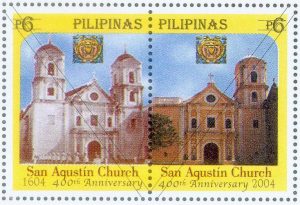Trivia about the San Agustin Church
The San Agustin Church, in Intramuros, marks this year the 400th anniversary of its construction. Finished in 1604, it becomes the oldest stone church in the Philippines.
The history of San Agustin dates back to 1570, year in which Legazpi founded Manila and the Augustinian fathers built the first temporary church with thatch and bamboo on the land donated to them by Legazpi himself. Three other churches were built and destroyed by fire. In 1586 the Augustinians, triggered by the new technique of stone cutting and lime and sand mixing, imported by Jesuit Antonio Sedeno, approved a resolution to construct a new church entirely of hewn stone. Construction started in 1587. Antonio de Morga and the private meeting of the Augustinians, reveal that in 1604 the church was already completed. Historically, then, the San Agustin Church is the oldest stone church in the country, despite claims by other churches for this distinction.
In 1762 the British forces sacked the Monastery and the Church and put to auction “their properties, books, manuscripts, silver marcos, gold and precious stones, ivory images, vestments and two portable organs.”
On June 3, 1863, a strong earthquake devastated Manila. The church did not suffer greatly but on July 16-25, 1880, one of its towers cracked and had to torn down later.
On August 4, 1898, the Americans attacked Manila. San Agustin became shelter for the sick, the old, women and children. Governor Jaudenes prepared the terms of the surrender of Manila at the Chapel of Our Lady of Angustias. On January 2, 1942, the Japanese occupied Manila and made San Agustin a concentration camp for prisoners, sheltering hundreds of families and religious priests, about 2,000 men including 150 Spaniards, many of whom they killed near the Palacio del Gobernador. The American troops seized the Church and the Monastery and stole books, artifacts, statues and moneys. The walls and the roof of the Church were heavily damaged.
In 1950 the Church was made a Parish, under the title of the Immaculate Conception. The First Plenary Council of the Philippines was held here in 1953. In 1976 san Agustin Church was declared a National Landmark, and in 1993 UNESCO listed it as one of the “baroque Churches of the Philippines.” On September 4, 2000, the Image of Our Lady of Consolation, venerated here since immemorial time, was canonically crowned by H.E. Jaime Cardinal Sin, D.D.
San Agustin has stood witness to the most devastating earthquakes and wars, a bedrock of the Filipino faith and culture
Stamps featuring the Quadricentennial of the San Agustin Church

Recent Comments